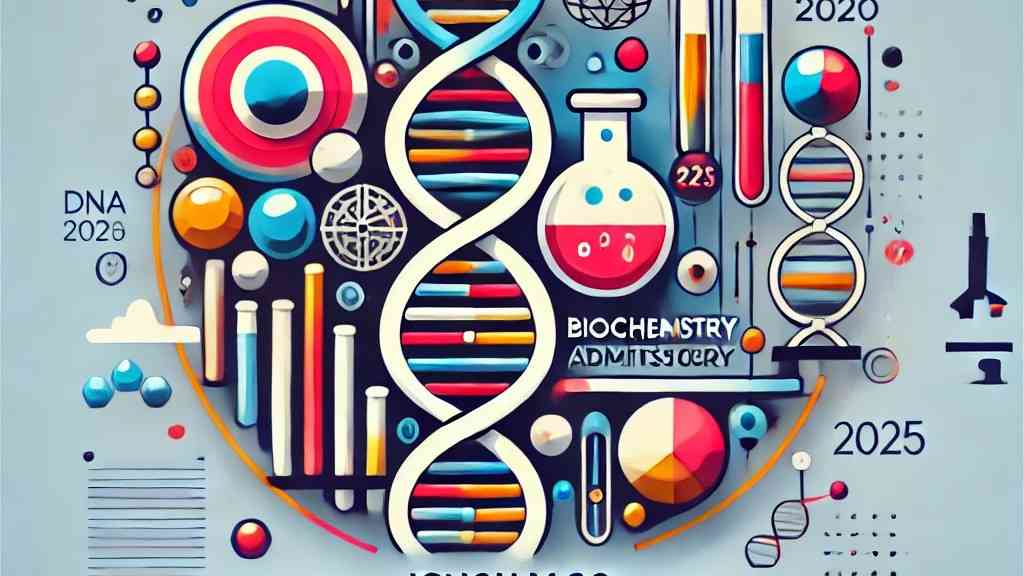Introduction
Overview of IGNOU and its Contribution to Distance Education
The Indira Gandhi National Open University (IGNOU) is one of India’s largest and most renowned institutions for distance education. Established in 1985, it offers a wide range of programs across various fields, aiming to make quality education accessible to people regardless of geographical barriers. With a flexible learning model, IGNOU has become a top choice for students who want to pursue higher education while managing other responsibilities.
Why Choose IGNOU for M.Sc. Bio-chemistry in 2025?
The M.Sc. Biochemistry programme at IGNOU provides an exceptional opportunity for students to gain an in-depth understanding of biochemistry through a well-structured curriculum. With its blend of theoretical knowledge and practical skills, this programme is designed to prepare students for various career paths in research, healthcare, and industrial sectors.
By choosing IGNOU, students benefit from:
- Flexible study options
- Access to high-quality learning resources
- Industry-relevant curriculum
In 2025, IGNOU is set to offer an even more refined and comprehensive M.Sc. Bio-chemistry course, making it a fantastic option for students aspiring to enter the field of biochemistry.
Importance of Biochemistry in Modern Science and Healthcare
Biochemistry is the branch of science that deals with the chemical processes within and related to living organisms. It is a crucial field for understanding the molecular mechanisms that govern life, which in turn has applications in medicine, biotechnology, agriculture, and environmental sciences. As the healthcare industry continues to evolve, biochemists are playing a pivotal role in drug development, disease diagnostics, and personalized medicine.
What is the M.Sc. Biochemistry Programme at IGNOU?
Programme Objective and Structure
The M.Sc. Bio-chemistry programme at IGNOU aims to equip students with both theoretical knowledge and hands-on practical skills in biochemistry. The curriculum is designed to cover essential topics like enzymology, metabolism, molecular biology, and bioinformatics, among others. The programme ensures that students are well-prepared for a variety of roles in scientific research, diagnostics, and industry.
Comprehensive Curriculum: Bridging Theory and Practical Knowledge
The IGNOU M.Sc. Bio-chemistry programme combines core subjects with elective options, providing students with a well-rounded understanding of biochemistry. The curriculum is structured to encourage critical thinking and problem-solving, ensuring students are ready to face challenges in the real world. Practical sessions, lab work, and online assignments will help students build the skills required for advanced research and applications in industry.
Flexibility of the Programme – A Look at the Semester System
The M.Sc. Bio-chemistry programme is divided into four semesters, offering students the flexibility to learn at their own pace. This semester-based approach allows students to manage their time effectively, balancing academics with personal commitments. With a minimum duration of 2 years and a maximum of 4 years, students can tailor their studies to suit their individual needs.
Duration and Credit System
Minimum and Maximum Duration of the Programme
The programme is designed to be completed in a minimum of two years. However, students have up to four years to complete it, providing ample time for those who may face external challenges. This flexibility is ideal for working professionals or students managing other responsibilities alongside their studies.
Understanding the Credit System and 80 Credits Breakdown
The M.Sc. Bio-chemistry programme at IGNOU is built on a credit system, where the entire programme consists of 80 credits. Each credit corresponds to approximately 30 hours of study, including lectures, practical sessions, assignments, and self-study. The total of 80 credits is spread over four semesters, with students expected to complete 20 credits per semester.
Importance of Completing the Programme Within the Timeframe
Although students have up to four years to complete the programme, it is recommended to complete the degree within the minimum two-year period. Finishing on time not only helps students maintain momentum but also ensures they enter the workforce or further studies at the right time, maximizing their career opportunities.
Medium of Instruction: English
Benefits of Studying in English for Biochemistry
The medium of instruction for the M.Sc. Bio-chemistry programme is English, which provides several advantages. First, English is the global language of science, making it easier for students to access international research papers, resources, and collaborate with experts from around the world. It also enhances employability, as English proficiency is a key requirement in many global organizations.
Global Recognition of the English Medium Approach
Studying in English allows graduates to be more competitive on the global stage. Whether pursuing further studies abroad or seeking employment in international firms, the ability to study and communicate effectively in English opens doors to global opportunities.
Eligibility Criteria for M.Sc. Biochemistry
Academic Requirements for Admission
To be eligible for the M.Sc. Biochemistry programme, candidates must have a Bachelor’s degree in one of the following fields:
- Science (with Physics, Chemistry, and Biology as core subjects)
- Pharmacy
- B.Tech (Biotech/Agriculture)
- Veterinary Science
- Nursing
- Medical Laboratory Technology
- Medical graduates
Eligible Degree Programs: A Detailed List
The following qualifications are acceptable for admission to the M.Sc. Biochemistry programme:
- Bachelor’s degree in Science with a focus on life sciences or physical sciences
- Pharmacy graduates
- Engineers in Biotechnology or Agricultural Engineering
- Nursing and Medical Laboratory Technology professionals
- Graduates with a background in medical fields, such as MBBS, BDS, or related areas
Age Bar: No Restrictions
One of the key advantages of the IGNOU M.Sc. Biochemistry programme is that there is no upper age limit for admission. This allows individuals of all age groups to pursue higher education without concerns about age restrictions.
Key Subject Prerequisites for Aspiring Biochemistry Students
Candidates should have a strong foundation in subjects like Biology, Chemistry, and Physics at the 10+2 level, as these subjects form the basis of the advanced biochemistry concepts covered in the programme.
Admission Process: Step-by-Step Guide
How to Apply for the M.Sc. Biochemistry Programme
The application process for the M.Sc. Biochemistry programme at IGNOU is simple and straightforward. Prospective students can apply online through the official IGNOU website. After registering, they need to fill out the application form, upload required documents, and pay the application fee.
Important Dates to Remember for 2025 Admission
For the 2025 admission cycle, students must keep track of important dates such as:
- Application start date
- Last date for submission of applications
- Dates for the entrance exam (if applicable)
- Admission results and enrollment deadlines
Documents Required for the Admission Process
The documents required for admission typically include:
- Proof of educational qualifications (mark sheets and certificates)
- Proof of identity (Aadhaar card, passport, etc.)
- Passport-sized photographs
- Category certificate (if applicable)
Selection Process and Admission Criteria
Selection is generally based on the eligibility criteria and entrance exam (if applicable). In some cases, students may be selected based on merit, considering their previous academic performance. However, there is no entrance exam for all candidates in the M.Sc. Biochemistry programme at IGNOU.
Fee Structure and Payment Options
Total Programme Fee: A Breakdown
The total fee for the M.Sc. Biochemistry programme is Rs. 36,200 per annum. This fee includes the cost of study materials, practicals, and other academic services provided by the university.
Payment Schedule and Methods
Students can pay their fees through various methods, including online payment via debit/credit cards, net banking, or through demand drafts. The fee is to be paid annually for the duration of the programme.
Financial Aid and Scholarships Available for Students
IGNOU offers financial assistance and scholarships to deserving students based on merit or financial need. Students can apply for these scholarships when they meet the eligibility criteria set by the university.
Programme Highlights
Key Features of the M.Sc. Biochemistry Programme
- In-depth knowledge of biochemistry and molecular biology
- Emphasis on practical skills and laboratory work
- Flexible learning options with an online study model
- Expert faculty and industry-oriented curriculum
Specializations and Elective Courses Offered
The programme offers elective courses in areas such as biotechnology, pharmaceutical biochemistry, forensic biochemistry, and agricultural biochemistry. This allows students to tailor their studies to align with their career aspirations.
Hands-on Laboratory Experience and Practical Exposure
The programme includes practical sessions where students can gain hands-on experience in biochemistry laboratories. These sessions are essential for understanding the real-world applications of biochemistry and preparing for careers in research and industry.
Career Opportunities After Completing M.Sc. Biochemistry
Research and Development Roles in Biochemistry
Graduates can pursue careers as research scientists, working in academic institutions, government labs, or private biotech companies. Research roles may involve studying new biochemical processes, developing drugs, or advancing technology in healthcare.
Clinical Biochemist: Career in Hospitals and Diagnostic Centers
Clinical biochemists play a vital role in diagnosing diseases by analyzing blood, urine, and other biological samples. Hospitals, clinics, and diagnostic labs are prime employers for graduates in clinical biochemistry.
Quality Control Analyst in Pharma and Agricultural Sectors
Graduates can also work in quality control departments within pharmaceutical companies and agricultural sectors. They ensure that products meet the required standards and regulations for safety and efficacy.
Becoming a Forensic Biochemist
Forensic biochemists assist law enforcement agencies in analyzing biological samples for criminal investigations. They play a crucial role in solving crimes by studying DNA, proteins, and other biochemical markers.
Teaching and Academia: Options for Biochemistry Graduates
For those inclined towards education, teaching is an excellent career option. Graduates can teach at various levels, including schools, colleges, and universities, and share their knowledge with future generations of students.
Potential for Pursuing Higher Studies or Research
Graduates of M.Sc. Biochemistry can also pursue Ph.D. programmes in biochemistry or related fields, further enhancing their research skills and career prospects.
Exit Option: Post Graduate Diploma in Biochemistry
Understanding the PG Diploma Option
Students who successfully complete the first two semesters (40 credits) of the M.Sc. Biochemistry programme can exit with a Post Graduate Diploma in Biochemistry. This exit option allows students to earn a credential early in their academic journey.
Benefits of Exiting After the First Two Semesters
The PG Diploma provides students with a professional qualification that can be used to enter the workforce. It also offers career flexibility for those who may want to pursue other opportunities before completing the full degree.
How the PG Diploma Enhances Career Prospects
The PG Diploma gives graduates a competitive edge, especially in industries such as healthcare, pharmaceuticals, and biotechnology. It demonstrates specialized knowledge in biochemistry, even without completing the full degree.
Skill Development and Practical Training
Laboratory Skills and Techniques Taught in the Programme
Students will learn essential laboratory skills, including techniques for protein analysis, enzyme assays, and DNA/RNA extraction. These skills are crucial for working in research labs, clinical settings, and industrial environments.
Developing Critical Thinking and Problem-Solving Skills
The M.Sc. Biochemistry programme encourages students to think critically, analyze complex biological systems, and find solutions to real-world problems. These problem-solving skills are highly valued in scientific research and industry.
Soft Skills and Communication Training for Biochemists
In addition to technical expertise, students will develop soft skills like communication, teamwork, and leadership. These skills are essential for working in multidisciplinary teams and presenting scientific findings effectively.
Scope of Biochemistry in Modern Healthcare and Scientific Fields
The Role of Biochemists in Healthcare Innovations
Biochemists are at the forefront of medical research, contributing to advancements in diagnostics, drug development, and personalized medicine. Their work helps to address complex health challenges and improve patient outcomes.
Industrial Applications and Cross-Industry Opportunities
Biochemists can also work in the pharmaceutical, agricultural, and food industries, where they contribute to product development, quality control, and safety assessments.
Contributions to Drug Development and Disease Research
Biochemists are instrumental in understanding disease mechanisms and developing therapies. Their work is crucial in areas such as cancer research, genetics, and virology.
IGNOU’s Support System for Students
Student Support Services: Guidance and Assistance
IGNOU offers a range of support services, including academic counseling, career guidance, and administrative assistance, to help students succeed throughout their studies.
Online Resources and Study Material for Distance Learners
As a distance-learning institution, IGNOU provides online resources and study materials, including e-books, recorded lectures, and interactive modules, to ensure students have access to quality learning materials.
Interaction with Faculty and Peer Networking Opportunities
Although the programme is distance-based, students can still interact with faculty members and peers through online forums, webinars, and virtual study groups, ensuring an engaging learning experience.
Success Stories: Alumni of M.Sc. Biochemistry from IGNOU
Real-Life Case Studies of Successful Graduates
Explore success stories of IGNOU M.Sc. Biochemistry graduates who have made significant contributions to research, healthcare, and industry.
Contributions of IGNOU Biochemistry Alumni in Various Fields
IGNOU’s alumni have gone on to work in prestigious organizations and contribute to groundbreaking research in biochemistry, healthcare, and biotechnology.
How the M.Sc. Biochemistry Programme Has Shaped Careers
Many graduates of the M.Sc. Biochemistry programme have found fulfilling careers in academic institutions, research labs, hospitals, and the pharmaceutical industry, thanks to the comprehensive education they received.
Final Thoughts and Conclusion
Why M.Sc. Biochemistry from IGNOU is a Great Career Investment
Choosing to pursue an M.Sc. Biochemistry from IGNOU is a smart investment in your future. With a robust curriculum, flexible study options, and excellent career prospects, this programme equips students with the knowledge and skills needed to succeed in the field of biochemistry.
The Future of Biochemistry Graduates in India and Abroad
As the demand for skilled biochemists grows globally, graduates of the M.Sc. Biochemistry programme from IGNOU will be well-positioned to take advantage of emerging career opportunities in healthcare, research, and industry.
Encouraging Prospective Students to Take the Leap
If you’re passionate about biochemistry and want to make a difference in the world of science and healthcare, the M.Sc. Biochemistry programme at IGNOU is an excellent choice. Take the first step towards a rewarding career today!
Additional Resources for Interested Candidates
For more information about the M.Sc. Biochemistry programme at IGNOU, including detailed admission guidelines, application forms, and FAQs, visit the official IGNOU website.
FAQs
What is the duration of the M.Sc. Biochemistry programme at IGNOU?
The M.Sc. Biochemistry programme at IGNOU is designed to be completed in a minimum of 2 years and a maximum of 4 years. This flexible duration allows students to balance their studies with other commitments.
What are the eligibility criteria for admission to the M.Sc. Biochemistry programme?
To be eligible for the M.Sc. Biochemistry programme, candidates must have a Bachelor’s degree in one of the following fields:
Science (with Physics, Chemistry, and Biology)
Pharmacy
B.Tech (Biotechnology/Agriculture)
Veterinary Science
Nursing
Medical Laboratory Technology
Medical graduates
Candidates must also have studied Physics, Chemistry, and Biology at the 10+2 level.
How much is the fee for the M.Sc. Biochemistry programme at IGNOU?
The total fee for the M.Sc. Biochemistry programme is Rs. 36,200 per annum. This includes study materials and practical sessions. The fee is to be paid annually for the duration of the programme.
What career opportunities are available after completing M.Sc. Biochemistry from IGNOU?
Graduates of the M.Sc. Biochemistry programme can pursue careers in a variety of fields, including:
Research and Development (R&D) in biochemistry
Clinical biochemist roles in hospitals and diagnostic centers
Quality control analysis in pharmaceutical and agricultural sectors
Forensic biochemistry
Teaching and higher studies opportunities
Is there an exit option in the M.Sc. Biochemistry programme?
Yes, students who successfully complete the first two semesters (40 credits) of the programme will be awarded a Post Graduate Diploma in Biochemistry. This provides an early credential and allows for career flexibility, should students choose to exit before completing the full M.Sc. degree.
Related Posts:
- IGNOU Email ID 2025: A Comprehensive Guide
- IGNOU BCom Program 2025: Admission Process, Fees, Criteria, Best Guide
- Admission For BLIS Program in IGNOU: A Comprehensive Guide for 2025
- Pursuing LLB Program from IGNOU 2025: Fees, Admission process, Study Material, Best Guide
- Download IGNOU Date Sheet for June 2025: A Best & Step-by-Step Process




